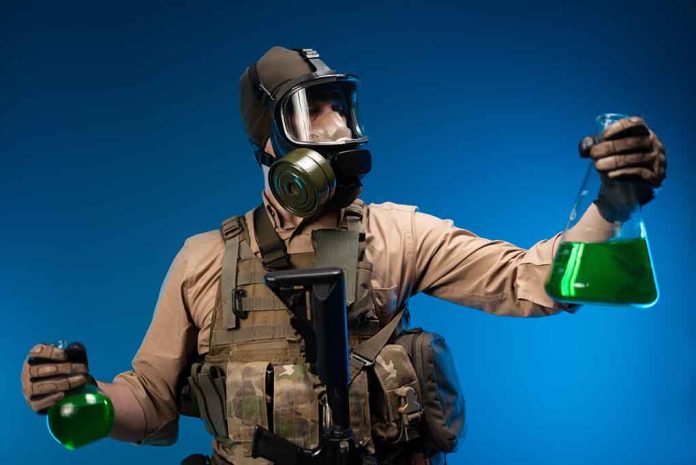
Syria’s unaccounted chemical weapons arsenal, a chilling legacy of the Assad regime, now threatens global security as extremist groups vie for control in the war-torn nation.
At a Glance
- The Organisation for the Prohibition of Chemical Weapons (OPCW) is closely monitoring Syria’s chemical weapons sites
- Significant amounts of chemical weapons remain unaccounted for, raising proliferation concerns
- Israel conducts airstrikes on suspected chemical weapons sites to prevent extremist acquisition
- The Assad regime used chemical weapons at least 17 times during the civil war
- U.S. and international allies deliberate on safeguarding measures to prevent misuse
OPCW’s Ongoing Vigilance
In the wake of Bashar al-Assad’s fall from power, the international community faces a grave challenge: securing Syria’s chemical weapons arsenal. The Organisation for the Prohibition of Chemical Weapons (OPCW) has taken center stage in this critical mission, intensifying its efforts to track and neutralize these deadly agents.
“monitoring closely the recent developments in Syria, with special attention to the status of its chemical weapons-related sites and other locations of interest.” – The Organisation for the Prohibition of Chemical Weapons
The OPCW’s statement underscores the urgency of the situation. With Assad’s government toppled and chaos reigning, the risk of these weapons falling into the wrong hands has never been higher. The international community’s failure to fully disarm Syria’s chemical arsenal during Assad’s reign now haunts us, as extremist groups like ISIS and Hayat Tahrir al-Sham eagerly eye these deadly prizes.
Unaccounted Weapons: A Ticking Time Bomb
The most alarming aspect of this crisis is the sheer volume of unaccounted-for chemical weapons. Despite Syria’s 2013 declaration and subsequent disarmament efforts, significant stockpiles remain unverified and potentially accessible to nefarious actors.
“Syria’s unaccounted for chemical weapons are \”extremely worrying,\”” – UN official
This stark assessment from a UN official highlights the gravity of the situation. The Assad regime’s history of deception and its documented use of chemical weapons at least 17 times during the civil war only amplifies these concerns. Now, with Assad granted asylum by Russia and his whereabouts unknown, the task of securing these weapons has become even more complex.
Israel’s Preemptive Strikes
In response to this looming threat, Israel has taken matters into its own hands. The Jewish state has conducted multiple airstrikes on suspected chemical weapons sites in Syria, aiming to destroy these deadly agents before they can be seized by extremist groups.
While some may criticize these actions as violations of Syrian sovereignty, the alternative – allowing these weapons to fall into the hands of terrorists – is far more terrifying. Israel’s proactive approach may well be preventing a catastrophic chemical attack on innocent civilians in the region or beyond.
International Response and Accountability
The United States and its allies are not sitting idly by as this crisis unfolds. U.S. Secretary of State Antony Blinken has voiced strong support for international efforts to hold the Assad regime accountable for its chemical weapons use. Meanwhile, U.S. Ambassador Nicole Shampaine has sounded the alarm about the proliferation risk posed by Syria’s undeclared chemical weapons.
These diplomatic efforts are crucial, and in addition, a U.S.-Israel collaboration to destroy remaining Syrian chemical weapons capabilities is happening now. Such a partnership leverages America’s resources and Israel’s regional expertise to neutralize this threat once and for all.
The Road Ahead
As streams of refugees return to Syria hoping for peace, the international community must act swiftly to ensure that chemical weapons do not derail this fragile progress. The stakes could not be higher – failure to secure these weapons could lead to their use by terrorist groups, potentially destabilizing not just Syria, but the entire region.
The time for half-measures and diplomatic niceties has passed. Decisive action to track down, secure, and destroy Syria’s remaining chemical weapons is imperative. Only then can we truly turn the page on this dark chapter of history and begin the process of rebuilding a safer, more stable Middle East.






















